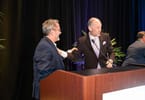Illness, family emergencies, rescheduled meetings—these are a big business for airlines. The resulting change fees and cancellation penalties passengers end up paying add up to a whopping $2 billion a year, according to new Department of Transportation filings.
At some airlines, the fees are heavier than baggage fees even though they get far less attention. At AMR Corp.’s American Airlines, travelers paid $116 million in change and cancellation penalties in the first quarter this year, compared with only $108 million in baggage fees.
“It’s a back-door way of charging higher airfares to frequent fliers, particularly business travelers, who have to change plans,” said Paul Hudson, executive director of the Aviation Consumer Action Project, a Washington advocacy group.
In February, the Transportation Department clarified rules on how airlines report ticket-change penalties to the government. The first-quarter numbers for 2009 offer the first accurate snapshot of how much consumers pay to make changes to non-refundable tickets. It turns out to be more than many realized.
Change and cancellation fees amount to an added 3.2% of U.S. airline passenger revenue, totaling $527.6 million for the first quarter. Business travelers pay the lion’s share.
Industry revenue from change fees is going up—even though fewer people are traveling—because several airlines have raised penalties. Amid high fuel prices last year, several big airlines pushed up the change fee on domestic tickets to $150 from $100. Even JetBlue Airways Corp. imposed a $100 change fee, up from $40, for reservations made online. Fees collected in the first quarter this year jumped 29% at JetBlue to $32.2 million from $25 million a year earlier.
That stealth shot of revenue is huge for airlines, helping them match discount airline prices, for example, while ending up with more revenue from customers to help cover higher costs.
Airlines say they charge change fees and cancellation penalties to give travelers incentives to purchase full-fare, unrestricted tickets and to limit no-shows for flights, reducing the need to overbook. By paying higher prices, travelers can buy flexibility and avoid change fees; lower prices represent a trade-off, with more restrictions. “Every traveler should weigh the likelihood they will have to change their itinerary prior to travel when assessing each fare type and price,” a spokesman for American said.
Unforgiving ticket penalties are unique to the airline industry; other industries typically either allow changes or cancellations, or allow buyers to swap or resell tickets they can’t use. Theaters and sports teams sell non-refundable tickets, but buyers can give them to friends or sell them. Hotels, restaurants and other service providers may charge fees for no-shows, but typically give customers time to cancel, imposing penalties only within 24 hours, or perhaps after 4 p.m. on the day of arrival.
At airlines, fares with any kind of discount are classified as non-refundable. Customers can change and use tickets within a year of purchase, but doing so usually results in a penalty of as much as $250 on international itineraries, plus the difference in fares if the new one is higher. With some low-cost fares, the penalty can approach if not equal the value of the original ticket.
Airlines say they make their tickets non-transferable because they don’t want companies buying up inventories of cheap tickets and doling them out for employee business trips or creating a secondary ticket market. But the penalties are a huge irritant for travelers. “I think it’s scandalous how the airlines are allowed to dictate the terms that they do,” says Richard Factor, a business traveler.
Steve Landes, who runs a Florida organization of travelers who commute by air between home and business, says many frequent travelers are switching to Southwest Airlines Co., which allows ticket changes without a penalty. “That $150 charge is a killer, and people avoid it. Airlines may think they are making money on it, but they must be losing money. They are sending their customers away,” Mr. Landes says.
A Southwest spokeswoman says the carrier hasn’t had to rely on penalties to manage overbooking because it takes historical patterns of customer cancellations and changes into account. She says the airlines believes it draws more customers by making it easier to change travel plans if necessary.
Still, the lure of all that potential fee revenue may be too strong to resist. Last week, Gary Kelly, Southwest’s chief executive, said in an earnings conference call that the airline had to consider the possibility of implementing new fees. “We’ve got to be open-minded to anything, quite frankly,” Mr. Kelly said.
Mr. Hudson, the consumer advocate, says airline penalties are most analogous to hotels’ late-cancellation rules, which often require one-night’s payment. Like an airline seat that flies empty, a hotel room that sits vacant for a night is lost revenue that can’t be recovered, so last-minute changes can be costly. “But most hotels give you the opportunity to cancel within a certain amount of time without penalty,” he said.
Airline rules are tougher on consumers “partly because of a lack of competition and partly a lack of regulation,” Mr. Hudson says. “Some of these things I think should be regulated.”
Midwest Airlines, a Milwaukee-based carrier catering to business travelers with low fares, recorded the heftiest passenger change fees as a percentage of passenger revenue. Midwest’s reported change and cancellation fees for the first quarter equaled 7% of passenger revenue. JetBlue was second at 4.6%. US Airways Group Inc. was also above average at 4.3%.
American, UAL Corp.’s United Airlines, Alaska Airlines and Virgin America Airlines all fell between 3% and 3.3%—about the industry average. AirTran Airways said first-quarter fees dropped 18% compared with a year earlier as a result of the drop in business travel this year. “Business travelers are the most likely to cancel reservations and incur the fee,” a spokesman said.
Delta Air Lines Inc. took the DOT category of “cancellation fees” quite literally and reported only cancellation fees, not change fees; DOT guidelines lump the two together. Many airlines reported in different ways until the DOT clarified the rules in February. A spokeswoman said Delta couldn’t change its reporting in time, so it reported cancellation fees of $3.6 million. After Delta bought Northwest, it changed how Northwest reports cancellation/change fees. Penalties imposed on tickets that get changed add up to a lot more than tickets that are canceled and never reused, because customers typically have a year to reuse the value of a canceled ticket.
When asked, Delta estimated total change and cancellation fees for the first quarter of $100 million for Delta and $58 million for Northwest . Comparisons with last year’s fee totals are difficult to make because many airlines reported the fees to the government as part of a catch-all miscellaneous revenue category, reporting $0 for the cancellation fees category. The DOT told airlines in February they needed to file properly going forward.
Spokesmen for American and AirTran agreed to provide their first-quarter 2008 change/cancellation fee totals when asked; Delta, Continental and US Airways all declined to provide the 2008 data.
WHAT TO TAKE AWAY FROM THIS ARTICLE:
- Customers can change and use tickets within a year of purchase, but doing so usually results in a penalty of as much as $250 on international itineraries, plus the difference in fares if the new one is higher.
- The resulting change fees and cancellation penalties passengers end up paying add up to a whopping $2 billion a year, according to new Department of Transportation filings.
- Airlines say they charge change fees and cancellation penalties to give travelers incentives to purchase full-fare, unrestricted tickets and to limit no-shows for flights, reducing the need to overbook.






















